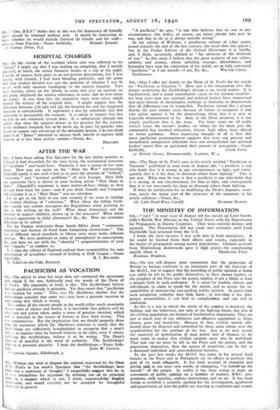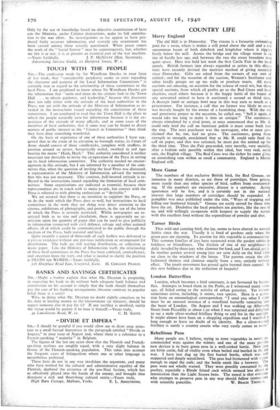Sia,—No one will dispute your contention that the projection of
Britain to foreign countries is an important part of the function of the M.O.I., but to suggest that the moulding of public opinion at home can safely be left to the public themselves, to their chosen leaders, or the prophets of the Press and the pulpit, implies, if not a blind, at least a myopic faith in such craftsmen. It is usual for leaders, chosen and self-chosen, to claim to speak for the nation, and to accept the re- sponsibility of interpreting and guiding public opinion. In peace-time such arrogation probably does little harm ; in war-time it has dan- gerous potentialities, it can lead to complacency, and can end in confusion.
As this is a war in which the whole of the country is involved, the feelings and the behaviour, not only of the fighting forces, but also of the civilian population, are matters of fundamental importance. They are just as much part of our defensive and offensive equipment as ships, planes, guns and munitions. Because of that, civilian morale ulti- mately must be directed and controlled by those upon whom rests the responsibility for the conduct of the war. Just as we now accept the necessity of mobilisation of man power and of finance, so we must come to realise that civilian opinion must also be mobilised. That task can no more be left to the Press and the priests, and the population themselves, than the output of munitions can be left to a thousand individual and unco-ordinated factories.
In the past few weeks the M.O.I. has come in for several hard knocks in the Press and in Parliament for its efforts to perform this part of its work efficiently. It has been accused of snooping and prying wad, to use your own words, of attempting " to bolster-up the morale-" of the people. In reality it has been trying to make an assessment. of public opinion -on a number of matters, B.B.C. pro- grammes, milk- supplies, cookery instructions, and so on. It has been trying to establish a scientific method for the investigation, qualitative and quantitative, of how the public are reacting to conditions and events.
Only by the use of knowledge based on objective examination of facts can the Ministry, under Cabinet instructions, make its full contribu- tion to the war effort. Its investigations so far appear to have pro- duced fairly accurate information, and scarcely any resentment has been caused among those actually questioned. When peace comes the work of the " Social Survey " may be supererogatory, but, whether we like it or not, it is at present an essential part of the war machine.



























 Previous page
Previous page